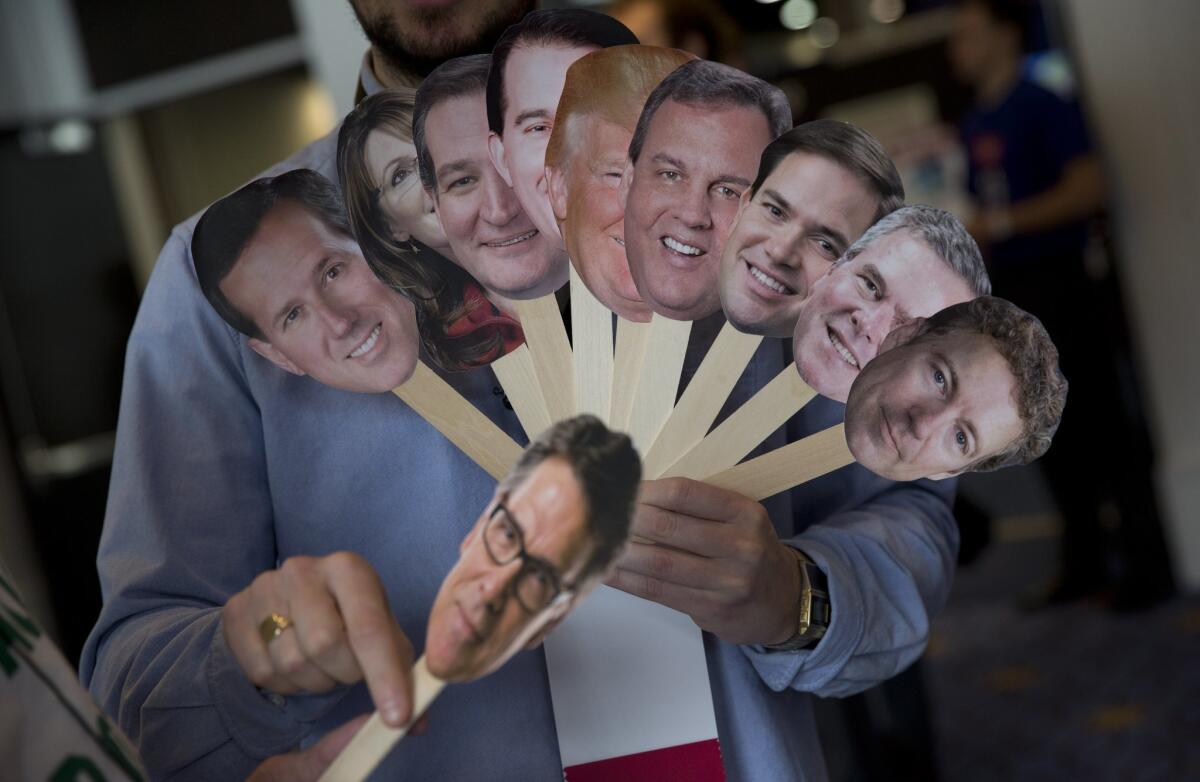Crowded GOP presidential field races through campaign forum

Fourteen Republican candidates took part in Monday’s forum in New Hampshire.
A Republican presidential forum on Monday felt more like speed dating than a typical political event. Candidates faced rapid-fire questions and spent a few minutes in the hot seat before being rotated offstage. They had little time to connect.
The two-hour gathering in New Hampshire featured 14 White House hopefuls who were questioned individually. The event offered a window into the limitations presented by the size of the Republican field.
A similar scenario will unfold in Cleveland on Thursday, when 10 candidates — those who rank highest in an aggregate of national polls — debate for 90 minutes.
The candidate leading the pack, businessman turned reality TV star Donald Trump, decided to forgo this forum after one of its hosts published an editorial criticizing him.
The 14 who showed up offered near unanimous agreement on talking points popular with Republican voters: Obamacare must be repealed. Planned Parenthood must be cut off from federal funds. President Obama’s proposed agreement with Iran to curb that nation’s ability to acquire a nuclear weapon jeopardizes Americans.
The recent videos of a Planned Parenthood official talking about its fetal-tissue donation practices showed “the level of depravity we have sunken to as a nation,” said candidate Ben Carson, a physician.
The deal with Iran “is the single greatest national security threat facing America,” said Sen. Ted Cruz of Texas.
National security provided the greatest contrast among a handful of candidates. Sen. Rand Paul of Kentucky spoke out against mass collections of Americans’ cellphone records without individual warrants.
The information captured “hasn’t caught any terrorists. It has not made us safer, but it has damaged the Bill of Rights,” Paul said.
(A federal court ruled in May that the National Security Agency’s warrantless collection was illegal.)
Sen. Marco Rubio of Florida, asked about Paul’s statement, disagreed. He said that as a member of the Senate Intelligence Committee, he sees on a near-daily basis how vulnerable the United States is to terrorism.
“We need every tool at our disposal,” Rubio said. “We have lost information we used to have.”
Paul, Rubio and Cruz participated in the forum remotely because of an ultimately unsuccessful Senate vote to stop federal funding of Planned Parenthood.
Former Pennsylvania Sen. Rick Santorum tried to draw a contrast between himself and the rest of the field, notably on the issue of immigrants who are competing with Americans for jobs. He has called for a 25% reduction in the number of unskilled workers entering the nation, and said he was the only candidate discussing how immigration adversely affects American workers.
“It’s a serious problem,” he said. “Everyone else is dancing around it.”
For the most part, the candidates largely avoided jabbing one another. Former Florida Gov. Jeb Bush used his 30-second closing statement to praise “the caliber of the people running for president. Every person participating in this debate is far better than any of the Democrats running.”
Most saved their criticism for Obama and Democratic front-runner Hillary Rodham Clinton.
Wisconsin Gov. Scott Walker criticized a proposal Obama made Monday to reduce coal plant emissions, calling it “a buzz saw to the nation’s economy.”
Sen. Lindsey Graham of South Carolina brought up Clinton’s refusal to state her position on the Keystone pipeline and the controversy over her use of a private email server. He mentioned Clinton’s husband — former President Bill Clinton — and his affair with a White House intern. He argued that the couple was incapable of honesty.
“I’ve been dealing with this crowd for 20 years. I’m fluent in Clinton speak,” Graham said. “When ... Bill says I didn’t have sex with that woman, he did. When she says I’ll tell you about building the pipeline when I get to be president, [it] means she won’t. And when she tells us, trust me, you got all the emails that you need, we haven’t even scratched the surface.”
Each of the candidates participating in the Voters First Presidential Forum at Saint Anselm College took fewer than 10 minutes of questions, spread out over two rounds. The moderator was Jack Heath of Manchester’s WGIR-AM radio. The forum was sponsored by news outlets from Iowa, New Hampshire and South Carolina.
Other White House hopefuls who participated in the forum were New Jersey Gov. Chris Christie, Ohio Gov. John Kasich, Louisiana Gov. Bobby Jindal, former New York Gov. George Pataki and former Hewlett-Packard Chief Executive Carly Fiorina.
Some of the more interesting responses came when candidates failed to answer a direct question.
Former Texas Gov. Rick Perry, whose 2012 presidential bid famously floundered after he failed to remember one of the three federal agencies he pledged to eliminate during a debate, was asked Monday which agencies he wants to eliminate.
“I’ve heard this question before,” Perry said, before launching into a recitation of his record as governor of Texas. He never named a single agency.
Follow @LATSeema for political news.
ALSO:
Republicans wonder: How do you debate Donald Trump?
How Obama’s new emissions rules will likely shape the White House race
Paid $1 to $3 a day, unauthorized immigrants keep family detention centers running
More to Read
Sign up for Essential California
The most important California stories and recommendations in your inbox every morning.
You may occasionally receive promotional content from the Los Angeles Times.











